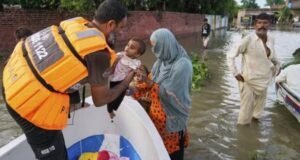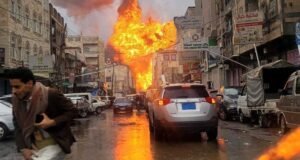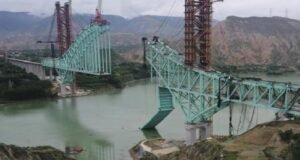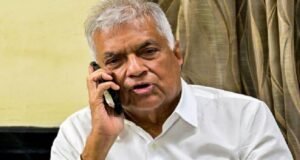
At least five people were killed in militant attacks in Pakistan on Thursday as the country voted in a general election after temporarily suspending mobile phone services and closing some land borders to maintain law and order, report AP and Reuters.
The interior ministry said it took the steps after at least 30 people were killed in two explosions near electoral candidates’ offices in the southwestern province of Balochistan on Wednesday.
Islamic State later claimed responsibility for those attacks.
“As a result of the recent incidents of terrorism in the country precious lives have been lost, security measures are essential to maintain the law and order situation and deal with possible threats,” the ministry said in a post on messaging platform X.
Thousands of troops were deployed on the streets and at polling stations across the country as voting commenced and borders with Iran and Afghanistan were temporarily closed.
Four policemen were killed in a bomb blast and firing targeting a police patrol in the Kulachi area of Dera Ismail Khan district in the northwest during the day, local police chief Rauf Qaisrani said.
One person was killed when gunmen opened fire on a security forces vehicle in Tank, about 40km (25 miles) to the north.
Heavy snowfall in the ski resort of Murree, near Islamabad, did not stop eager voters from heading to the polls. People also lined up to cast their ballots in snow-covered plains in eastern Punjab province and the mountains of southern Sindh province.
“As a result of the recent incidents of terrorism in the country precious lives have been lost, security measures are essential to maintain the law and order situation and deal with possible threats,” the interior ministry said in a message on X.
The move to suspend mobile networks sparked criticism from leaders of opposition parties, with the Pakistan Peoples Party’s Bilawal Bhutto Zardari, the 35-year-old son of former premier Benazir Bhutto, calling for its “immediate restoration”.
“(I) have asked my party to approach both ECP (Election Commission of Pakistan) and the courts for this purpose,” he posted on messaging platform X.
Chief Election Commissioner Sikandar Sultan Raja said the decision on mobile networks was made by “law and order agencies” following Wednesday’s violence and the commission would not interfere in the matter.
Grenade attacks were also reported in different parts of Balochistan, but polling remained unaffected there since there were no casualties, Saeed Ahmed Umrani, commissioner of the Makran division, told Reuters.
Mohsin Dawar, a candidate from North Waziristan – a hotbed for insurgents in northwest Pakistan – said in a letter to the Election Commission of Pakistan (ECP), that some polling stations in his constituency were taken over by local “Taliban” who were threatening polling staff and locals.
There was no immediate confirmation from the election commission or security forces.
In spite of the security worries and bitter winter cold, long queues began forming at polling stations hours before voting was due to start. “The country is at stake, why should I come late?” said 86-year-old Mumtaz, a housewife a decade older than Pakistan itself as she queued up in Islamabad.
Unofficial first results in the election are expected a few hours after voting closes at 5pm (4pm UAE time) and a clearer picture is likely to emerge early on Friday.
Khan cast his vote via postal ballot from a prison in Rawalpindi on Thursday morning, his party’s media team told Reuters.
Remove passwords
The move to suspend mobile networks sparked criticism from leaders of opposition parties, with the Pakistan Peoples Party’s Bilawal Bhutto Zardari, the 35-year-old son of former premier Benazir Bhutto, calling for its “immediate restoration”.
Chief Election Commissioner Sikandar Sultan Raja said the decision on mobile networks was made by “law and order agencies” following Wednesday’s violence and the commission would not interfere in the matter.
Jailed former Prime Minister Imran Khan’s Pakistan Tehreek-e-Insaf (PTI) party, in a post on X, called on people to remove passwords from their personal Wifi accounts “so anyone in the vicinity can have access to internet on this extremely important day”.
Some voters also expressed anger at the suspension of mobile services. ECP officials said they received several complaints from people who were unable to find their polling stations because of the internet shutdown.
“The communication with voters and others are very difficult … we are facing so many problems due to the internet closure,” said 50-year-old Mehmood Chaudry, a school teacher who cast his vote in the city of Rawalpindi.
The network suspension also follows Imran Khan’s call to his supporters, who had clashed with security forces while protesting his arrest last year, to wait outside polling booths until results are announced.
Former prime minister Nawaz Sharif, considered by many analysts to be the front-runner, dismissed talk of an unclear result and emphasised the need for a “clear majority”.
“Don’t talk about a coalition government. It is very important for a government to get a clear majority…it should not be relying on others,” he told reporters after casting his vote in the eastern city of Lahore.
The main contests are expected to be between candidates backed by Khan, whose party won the last national election, and the Pakistan Muslim League of Sharif.
Sharif the front-runner
Unofficial first results in the election are expected a few hours after voting closes at 5pm (1200 GMT) and a clearer picture is likely to emerge early on Friday.
The main contests are expected to be between candidates backed by Khan, whose party won the last national election, and the Pakistan Muslim League of three-time premier Nawaz Sharif, who is considered the front-runner.
Shehbaz Sharif confirmed in an interview with the Geo news channel that his brother would become prime minister if their party wins a majority of the vote.
Bhutto Zardari has also run an aggressive campaign in an outside bid for the top office.
In spite of the bitter winter cold, long queues began forming at polling stations hours before voting was due to start. “The country is at stake, why should I come late?” said 86-year-old Mumtaz, a housewife a decade older than Pakistan itself as she queued up in Islamabad.
 Weekly Bangla Mirror | Bangla Mirror, Bangladeshi news in UK, bangla mirror news
Weekly Bangla Mirror | Bangla Mirror, Bangladeshi news in UK, bangla mirror news







